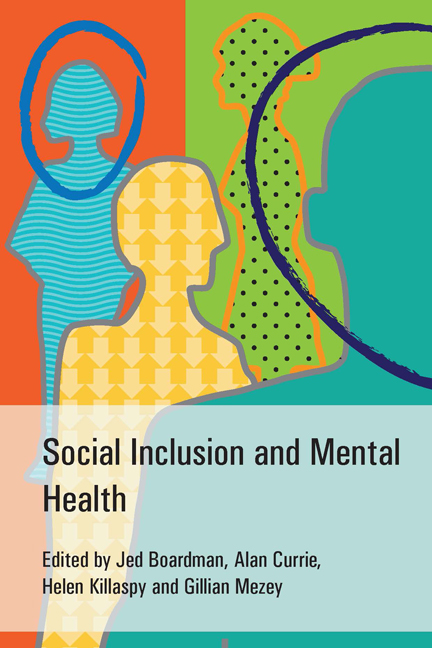Book contents
- Frontmatter
- Contents
- List of contributors
- List of tables
- Foreword
- Preface
- Acknowledgements
- Scoping Group on Social Inclusion, Royal College of Psychiatrists
- Part 1 What is social exclusion?
- 1 Introduction
- 2 Concepts of social exclusion
- 3 Social exclusion of people with mental health problems and learning disabilities: key aspects
- 4 Policy and social exclusion
- 5 How is social exclusion relevant to psychiatry?
- 6 Socially inclusive working across the psychiatric subspecialties
- Part 2 Social exclusion: the scope of the problem
- Part 3 Working towards inclusive psychiatry
- Index
1 - Introduction
from Part 1 - What is social exclusion?
- Frontmatter
- Contents
- List of contributors
- List of tables
- Foreword
- Preface
- Acknowledgements
- Scoping Group on Social Inclusion, Royal College of Psychiatrists
- Part 1 What is social exclusion?
- 1 Introduction
- 2 Concepts of social exclusion
- 3 Social exclusion of people with mental health problems and learning disabilities: key aspects
- 4 Policy and social exclusion
- 5 How is social exclusion relevant to psychiatry?
- 6 Socially inclusive working across the psychiatric subspecialties
- Part 2 Social exclusion: the scope of the problem
- Part 3 Working towards inclusive psychiatry
- Index
Summary
Social exclusion is a term of relatively recent origin which has come into use in the area of social policy and has particular relevance for people with mental health problems and learning disability (Office of the Deputy Prime Minister, 2004). It encapsulates the position of many people with mental health problems and learning disability in contemporary society, as well as summarising their position in history. This book sets out to outline the meaning of social exclusion, the ways in which people with mental health problems and learning disability are excluded, and the implications of this for the training and practice of psychiatrists (and, by implication, other mental health professionals) and the services in which they work. The book seeks to inform by examining and evaluating the nature of social exclusion and the ways in which people with mental health problems and learning disability are excluded. In the subsequent chapters we build up a picture of social exclusion of those people in Britain in the 21st century. This picture illustrates that social exclusion is an objective reality in their lives; it is reflected in their own subjective experiences and is open to the independent scrutiny of health professionals.
In this book we set out a case for why social exclusion should be of concern to psychiatrists and others working in mental health services and why these services should be designed to be ‘socially inclusive’. The nature of social exclusion and its relation to ill health makes it a legitimate concern to mental health professionals. However, this is only one of several possible standpoints from which the significance of social exclusion to mental health professionals can be assessed, which in turn raises the matter of professional values. A stream of possible actions follows from these concerns. How might the exclusion of people with mental health problems and learning disability be diminished? How might their participation in mainstream society be increased? What is the role of mental health services and mental health professionals in this? What are the implications for the training and practice of professionals, and the organisation, delivery and culture of mental health services? Finally, what should be the role of mental health professionals in influencing policy and public opinion?
- Type
- Chapter
- Information
- Social Inclusion and Mental Health , pp. 3 - 9Publisher: Royal College of PsychiatristsFirst published in: 2017

